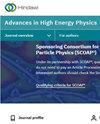Role of Focusing Distance in Picosecond Laser-Induced Cu Plasma Spectra
IF 1.1
4区 物理与天体物理
Q3 PHYSICS, PARTICLES & FIELDS
引用次数: 0
Abstract
To study the effects of focusing distance on the characteristics of copper plasma, a picosecond laser is utilized to ablate a pure copper plate to generate a plasma spectrum. Following numerous experiments on the subject, three significant factors are determined: lens focal length, pulse energy, and the lens-to-sample distance. These factors are employed to analyze the spectral intensity, plasma temperature, and electron density in the local thermodynamic equilibrium (LTE) and optically thin condition. Due to the shielding effects of mixed plasma, the strongest spectral intensity is achieved in the prefocused case, no matter how much beam irradiance is employed. The more intensive the beam irradiance is, the more the optimal position is distant from the focal point. The variation of plasma temperature and electron density showed a peak in the prefocused case, which is consistent with the trend of spectral intensity. For the case of extremely high irradiance (on the focus), the shielding effects become seriously, and the resultant above three factors decreased sharply. When a longer-focal-length lens is employed, the spectral intensity exhibited an obvious bimodal trend. In the prefocused case, a longer-focal-length lens is helpful to eliminate the effects of the roughness of the target surface compared with a shorter one. Finally, the assumed LTE is validated by McWhirter relation, plasma relaxation time, and diffusion length, and the optically thin condition was also validated by spectral intensity ratio. We hope that this work could be an important reference for the future design of highly optimized experiments for Calibration-Free Laser-Induced Breakdown Spectroscopy (CF-LIBS).聚焦距离在皮秒激光诱导铜等离子体光谱中的作用
为了研究聚焦距离对铜等离子体特性的影响,利用皮秒激光烧蚀纯铜板产生等离子体光谱。经过对该主题的大量实验,确定了三个重要因素:透镜焦距、脉冲能量和透镜到样本的距离。这些因素被用来分析在局部热力学平衡(LTE)和光学薄条件下的光谱强度、等离子体温度和电子密度。由于混合等离子体的屏蔽效应,无论使用多少光束辐照度,在预聚焦的情况下都能获得最强的光谱强度。光束辐照度越强,最佳位置离焦点越远。等离子体温度和电子密度的变化在预聚焦的情况下出现峰值,这与光谱强度的趋势一致。对于(焦点上)极高辐照度的情况,屏蔽效应变得严重,由此产生的上述三个因素急剧下降。当使用较长焦距的透镜时,光谱强度呈现出明显的双峰趋势。在预聚焦的情况下,与较短的透镜相比,较长的焦距透镜有助于消除目标表面粗糙度的影响。最后,通过McWhirter关系、等离子体弛豫时间和扩散长度验证了假设的LTE,并通过光谱强度比验证了光学薄条件。我们希望这项工作能为未来设计无校准激光诱导击穿光谱(CF-LIB)的高度优化实验提供重要参考。
本文章由计算机程序翻译,如有差异,请以英文原文为准。
求助全文
约1分钟内获得全文
求助全文
来源期刊

Advances in High Energy Physics
PHYSICS, PARTICLES & FIELDS-
CiteScore
3.40
自引率
5.90%
发文量
55
审稿时长
6-12 weeks
期刊介绍:
Advances in High Energy Physics publishes the results of theoretical and experimental research on the nature of, and interaction between, energy and matter. Considering both original research and focussed review articles, the journal welcomes submissions from small research groups and large consortia alike.
 求助内容:
求助内容: 应助结果提醒方式:
应助结果提醒方式:


